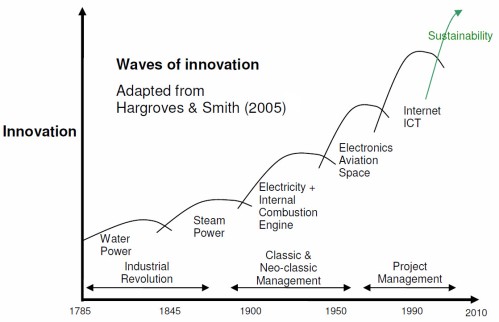As many readers of this blog know, I am interested in history focused on understanding how the professional discipline of project management has evolved over the years. But digging into the history of project management inevitable involves the history of management and the evolution of technology. And one immutable fact is that every new technology and every new idea creates winners and losers. The new ‘thing’ is implemented using project management processes and overall society benefits. The current collection of ‘history papers’ are freely available for downloading at: http://www.mosaicprojects.com.au/PM-History.html
One of the key papers is The Origins of modern PM, this paper takes a brief look (page 8 on) at the evolution of management theories .compared to the waves of innovation that drove the ‘industrial revolution’ and advancements in society through to the modern times.
Fighting advances in technology is pointless, as the Luddites discovered. The origin of the name Luddite is uncertain, a popular theory is that the movement was named after Ned Ludd, a youth who allegedly smashed two stocking frames in 1779, and whose name had become emblematic of machine destroyers. What is certain is the Luddites were 19th-century English textile artisans who protested against newly developed labour-replacing machinery from 1811 to 1817. The stocking frames, spinning frames and power looms introduced during the Industrial Revolution threatened to replace the artisans with less-skilled, low-wage labourers, leaving them without work. What actually happened was the rise of the UK Midlands into an industrial powerhouse. There were winners, losers, and exploitation but overall the changes in society were to the general good.
What is not realised in the current debate around global warming and coal is that electricity produced in coal fires powers stations is a straightforward extension of steam power that came to dominance in the 1840s and is as inefficient as any other steam powered engines. What the electrical distribution system does is allow the energy derived from burning the coal to be transferred to remote locations ‘away from the fire’ for use as needed. It is convenient and electricity fuelled the next wave of innovation, but is also inefficient.
The typical thermal efficiency for utility-scale electrical generators is around 33% for coal fired plants, 66% of the energy in the coal is wasted Then an additional 30% to 40% of the power is then lost in the transmission from the power station to the consumers (mostly in local distribution, the main grid only loses between 5% and 8% of the power). The net result only about 25% of the thermal value of the coal is available in your home or business!
This gross inefficiency is only affordable because the industry does not have to pay to clean up its pollution; most of the waste is simply discharged to the atmosphere. The raw material is not particularly safe either; around 5000 people per year are killed mining coal.
Much of the innovation driving the sustainability curve focuses on a changed paradigm. Generating energy close to where its needed using renewable energy sources. Solar hot water units generate hot water on your roof – no transmission losses. Solar voltaic cells do the same for electricity – managed properly its cost effective, for 6 months of the year we hardly need any power from the grid, winter is a different story……
Other innovations include various wind, and other generation processes that create power close to where its needed as well as renewable base load capabilities; all that is needed is the critical mass to make the technology cost effective (ie, cheap) and leadership for government to manage the changes and help the industries and people on the ‘losing’ side of the equation and plot a path into an exciting future, particularly for skilled project professionals. As the Luddites discovered, fighting to defend a losing technology is a guaranteed way to ensure you lose.
Unfortunately, I’m still wondering when the Luddites in Canberra are going to realise the burning of coal to create pressurised steam is an invention of the 18th century, which largely replaced water power as the energy source of choice. And, that after 300 years the world is moving forward but Tony Abbot and a range of other backward looking ‘conservatives’ want to keep dragging us back into the past.
Australia needs leaders in Canberra and our State capitals, not Luddites – fighting to preserve 18th century power source in the 21st century is guaranteed to fail eventually. And what is going to be lost focusing on the past is the opportunities to gain from the emerging technologies, a lose-lose outcome.
A well planned and executed change paradigm exploits the strengths of existing capabilities, encourages the development of new innovations and manages the transition to the future whilst minimising the losses. This transition is good for project management but cannot happen without effective leadership.


